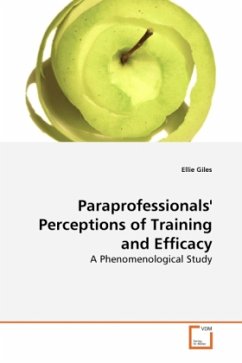There has been an increase of paraprofessional service in special education as the primary mechanism for supporting students with disabilities in the general education classroom. The practice of using unqualified paraprofessionals as the primary support for students with disabilities is commonplace. Paraprofessional employment made up half of all employment growth and the demand for paraprofessionals continues. The findings of the study described in this book confirmed a relationship between training and efficacy identifying a need for relevant training addressing the paraeducators' changing role and responsibilities. Integrated themes revealed two pertinent and interrelated forms of efficacy, organizational efficacy and self-efficacy. Recommendations include strategies to optimize the utilization of special education paraeducator enhancing the educational programming for students with special needs. Given the increased demand for special education paraprofessional services, providing educational leadership with an understanding of the paraprofessionals' perceptions and experiences is significant to the development of effective training content, method, and delivery.
Bitte wählen Sie Ihr Anliegen aus.
Rechnungen
Retourenschein anfordern
Bestellstatus
Storno








